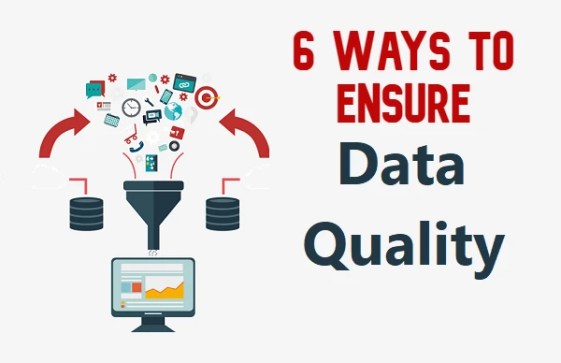No matter what business you’re in, data is a critical part of your operation. Without accurate and reliable data, making informed decisions about your product, your customers, or your business is impossible. That’s why data quality is so important. In this blog post, we’ll discuss six ways to ensure that the data you’re working with is of the highest quality.

Implement A Data Governance Program
Implementing a data governance program is one of the best ways to ensure data quality. Data governance creates and enforces standards for the observability, collection, storage, use, and disposal of data.
This includes specifying who is authorized to access data, setting guidelines for how data should be formatted and structured, and creating procedures for dealing with corrupted or inaccurate data. For more information, check out Databand’s definitive guide to data observability.
A data governance program can help you ensure that your data is consistently accurate and reliable, allowing you to make better decisions about your business. It can also help you comply with regulations governing personal data or handling sensitive information.
Establish Data Quality Standards
To maintain data quality, standards must be put into place. These standards will vary depending on your business and specific needs, but some common factors include accuracy, completeness, timeliness, and consistency. Once you have established these standards, you can start working on ways to ensure that your data meets them.
One way to do this is by implementing a data quality assessment process. This process involves periodically reviewing your data to identify any errors or discrepancies. Once these issues have been identified, you can implement strategies to fix them. This might include anything from correcting inaccurate data to deleting duplicate records.
Use Data Profiling And Data Cleansing Tools
Data profiling and data cleansing are two essential tools for ensuring data quality. Data profiling is the process of examining your data to look for patterns and anomalies. This can help you identify errors or inaccuracies that need to be corrected. Data cleansing is correcting those errors and ensuring that your data conforms to your established standards.
Many different software programs can help you with data profiling and data cleansing. Databases such as Microsoft SQL Server and Oracle Database have built-in data quality tools that can be used to profile and cleanse your data. Several standalone data quality software programs are available, such as Talend Data Quality and Informatica Data Quality.
Both data profiling and data cleansing are essential for maintaining high-quality data. However, data cleansing can be a time-consuming and tedious process. If you don’t have the resources or the patience to do it yourself, you can always outsource this work to a data quality services provider.
Create A Culture Of Quality
Data quality doesn’t just depend on having the right tools and processes in place; it also depends on having the right culture within your organization. Creating a quality culture means instilling a commitment to excellence in everyone who works with your data. It means setting high standards and holding everyone accountable for meeting those standards. Creating this kind of culture might take some time, but it’s worth the effort if it means having higher-quality data.
One way to create a culture of quality is by establishing clear roles and responsibilities. Everyone who works with your data should know exactly what their part is and what they are responsible for. This will help ensure that everyone is working towards the same goal of maintaining high-quality data.
Another way to create a culture of quality is by providing training and education on data quality. This can help everyone in your organization understand the importance of data quality and how to maintain it.
Make Data Quality A Priority
It’s not enough to talk about the importance of data quality; you also have to make it a priority in your organization. This means allocating adequate resources to maintain and improve data quality and holding people accountable when errors or discrepancies occur. Making data quality a priority shows that you understand its importance and are committed to ensuring that your organization has access to reliable and accurate information.
Outsource To A Trusted Provider
There are many benefits to outsourcing tasks like data entry or customer service. Still, one of the most important is that it can help improve the overall quality of your data. When you outsource tasks to a trusted provider, you can be confident that they will follow all of the procedures and guidelines you’ve established for collecting and maintaining accurate information.
This can free up time for your employees to focus on other tasks while ensuring that the data they’re working with is high-quality. And, if you’re not happy with the quality of the information you’re receiving from your outsourcing provider, you can always switch to another provider.
Outsourcing data quality tasks can be a great way to improve the overall quality of your data. Just be sure to choose a reputable and trusted provider.
Conclusion
Data quality is essential for any organization that relies on data to make decisions. There are different ways to ensure data quality, including data profiling, data cleansing, establishing clear roles and responsibilities, providing training and education on data quality, prioritizing data quality, and outsourcing to a trusted provider.
By taking these steps, you can be sure that your data is of the highest quality. And if you need guidance on your pursuit of better data quality, check out Databand’s definitive guide to observability.
Tags: How to ensure data accuracy, how to ensure data quality in healthcare, how to ensure data quality in qualitative research, data quality checklist, how to ensure data quality, how to ensure data quality and integrity, data quality check methods, data quality best practices.
